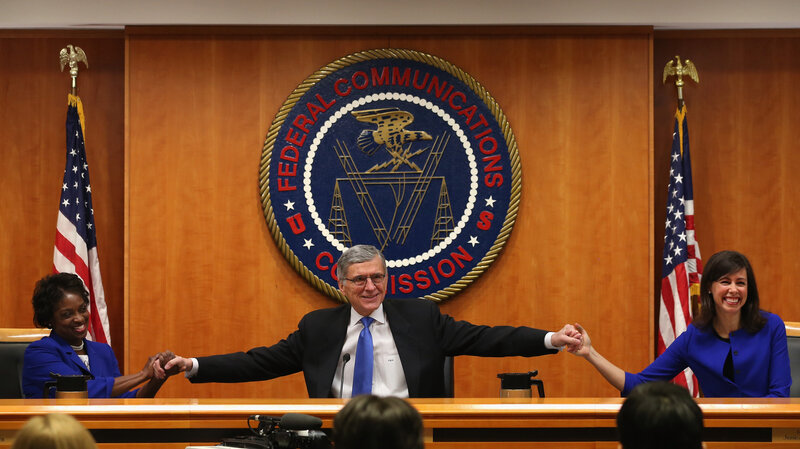
At the start of a meeting to decide the issue of net neutrality, Federal Communications Commission Chairman Tom Wheeler, center, holds hands with FCC Commissioners Mignon Clyburn, left, and Jessica Rosenworcel at the FCC headquarters Thursday.
Mark Wilson/Getty Images
hide caption itoggle caption Mark Wilson/Getty Images
At the start of a meeting to decide the issue of net neutrality, Federal Communications Commission Chairman Tom Wheeler, center, holds hands with FCC Commissioners Mignon Clyburn, left, and Jessica Rosenworcel at the FCC headquarters Thursday. Mark Wilson/Getty Images
The Federal Communications Commission approved the policy known as net neutrality by a 3-2 vote at its Thursday meeting, with FCC Chairman Tom Wheeler saying the policy will ensure "that no one — whether government or corporate — should control free open access to the Internet."
The policy helps to decide an essential question about how the Internet works, requiring service providers to be a neutral gateway instead of handling different types of Internet traffic in different ways — and at different costs.
"Today is a red-letter day," Wheeler said later.
The dissenting votes came from Michael O'Rielly and Ajut Pai, Republicans who warned that the FCC was overstepping its authority and interfering in commerce to solve a problem that doesn't exist. They also complained that the measure's 300-plus pages weren't publicly released or openly debated.
Our original post continues:
The new policy would replace a prior version adopted in 2010 — but that was put on hold following a legal challenge by Verizon. The U.S. Court of Appeals for the D.C. Circuit ruled last year that the FCC did not have sufficient regulatory power over broadband.
After that ruling, the FCC was left to reclassify broadband in a way to gain broader regulatory powers.
Update at 1 p.m. ET: FCC Adopts Net Neutrality
By a 3-2 vote, the FCC votes to adopt net neutrality rules to "protect the open Internet."
Update at 12:50 p.m. ET: Wheeler Draws Applause
Chairman Tom Wheeler is speaking, meaning a vote is looming.
"The action that we take today is an irrefutable reflection of the principle that no one — whether government or corporate — should control free open access to the Internet," FCC Chairman Tom Wheeler said, drawing applause and whoops of approval from some of those in attendance.
Update at 12:01 p.m. ET: A Dissenting Vote
Saying the FCC was seizing power in "a radical departure" from its earlier policies. Commissioner Ajut Pai, a Republican, spoke against the proposal. He accused the FCC of "turning its back on Internet freedom."
Pai said that the commissioners were backing the new measure for only one reason: "because President Obama told us to."
Seeing the new policy as an attempt to intrude on the Internet, Pai predicted higher costs for consumers and less innovation by businesses.
Update at 11:25 a.m. ET: 'Open Internet' Portion Has Begun
After dealing with another issue (of municipalities being able to control broadband service), the FCC has turned to the new proposal.
The proposal was introduced at today's meeting by Julie Veach, chief of the FCC's Wireline Competition Bureau, who said it "would set forth clear, sustainable, enforceable rules to preserve and protect the open Internet as a place for innovation and free expression."
She said the order "builds on the views of some 4 million Americans" who responded to a request for comments.
Guest speakers included Etsy CEO Chad Dickerson and writer and TV producer Veena Sud, whose show The Killing survived with the help of Netflix. A short video from Tim Berners-Lee was also shown.
Our original post continues:
Precise terms and details of the policy have not been made publicly available — a situation that prompted two Republican FCC commissioners to seek to postpone today's vote. That request was denied.
Summarizing "What You Need To Know" about today's vote, Eyder wrote for the Two-Way, "Without net neutrality rules, ISPs could theoretically take money from companies like Netflix or Amazon to speed up traffic to their sites."
Thursday's vote comes after Commissioners Michael O'Rielly and Ajut Pai asked that the FCC "immediately release the 332-page Internet regulation plan publicly and allow the American people a reasonable period of not less than 30 days to carefully study it."
That request was denied; we'll post the document here when it's available.
Poster Comment:
More freedom from the Kenyan.
Be sure to thank any Obama supporter you know for helping to change the structure of the 'net.